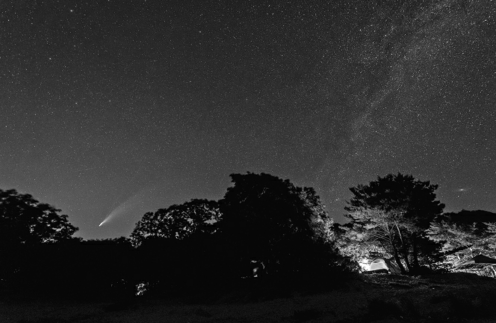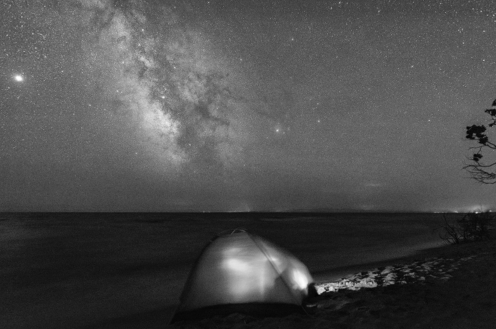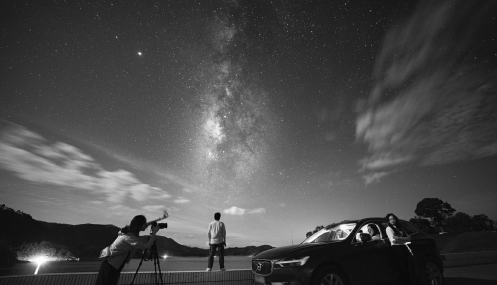UNIVERSAL APPEAL
A greater number of people are looking to the heavens as a way of grounding themselves and shaking off the stress of modern life, Du Juan reports

"If someone has not seen Saturn and its rings, they should do so at least once in their lives. It's the prettiest among all the principal planets."
This is what Wang Junling, born in 1979, believes after watching the night sky, in both China and Australia, for the past decade.
"I started stargazing in 2012 in Beijing, when I bought my first telescope, which was just an entry-level model with a price of around 1,000 yuan ($140)," he said. "Then, I called some friends and invited them to join me."
Wang found a good spot and set up the telescope and more than 20 of his friends came to enjoy views of the beautiful night sky together. Most of them didn't have much knowledge of astronomy, unlike Wang. However, with his helpful explanations, everybody enjoyed a good experience that night, Wang recalls.
Later, one of those friends even bought his own telescope as a result.
"After that, it became a frequent activity — like every weekend," he said. "Sometimes, I would ask friends to join me, other times I would just spontaneously go alone, depending on the weather and my mood."
Wang went to Australia to pursue a doctoral degree in 2015, taking a smaller telescope with him to continue his hobby there.
"It's easier to see stars in Australia since it's not hard to find a dark area there," he said. "Sometimes, I didn't even use the telescope, I would just look at the shining stars with the naked eye."
After Wang returned to China in 2020, he soon discovered that stargazing had become a popular trend among the country's youngsters.
He organized four stargazing activities by just sending a message in WeChat group. Each one attracted more than 40 people, double the number it used to be.
"I found a place with good observation conditions in Chaoyang Park, where, as well as staring at the stars, people can also camp and picnic," he said. "During our events, some people listen and dance to music, some eat, some observe the night sky and the Milky Way and others chat.
"It's more like a social event rather than a formal meeting of stargazing enthusiasts digging into the mysteries of the cosmos. I like that kind of atmosphere. It is very relaxing," Wang said. "My academic major was artificial intelligence, which is not related to my hobby at all. All of my interest in the stars and space came from my childhood when my father, who was a physics teacher, taught me how to identify the different constellations.
"It's a very good trend that an increasing number of people are looking up to the sky, no matter whether they have the related knowledge or not," he said with a happy tone, noting that everyone should enjoy the beauty of nature.
"There is huge, almost spiritual, satisfaction in the experience," Wang explained. "There's no doubt that you can see much clearer pictures of the planets on internet or in books, but the feeling is totally different when you view them directly."
Unlike Wang, who enjoys stargazing only in cities and the nearby suburbs, and never spends time on photographing what he sees, many astronomy enthusiasts in China travel long distances to pursue the stars, especially when major astronomical phenomena occur, such as meteor showers or supermoons.
They bring their professional equipment and travel to places such as Ningxia Hui autonomous region, Gansu and Hainan provinces — locations with the best observation conditions, to capture the best picture of the stars with their cameras.
In July 2020, Qiu Han, who is well-known for snapping great photos of snowy mountains, traveled from his home in Chengdu, Sichuan province, to Yongtai county in Gansu province, to pursue a big comet.
"The whole process was spontaneous. I was amazed by other people's pictures of the comet, which was said to be the brightest in 23 years in the Northern Hemisphere," he said during an interview with local media.
"So, I booked tickets and went to chase the star, aiming to capture the best image of it. "
Qiu shot a video about his comet-chasing adventure and posted it to social media, which has, so far, been viewed more than 17,000 times.
With the development of China's astronomy education and the space industry, Chinese people have an increasing interest in stargazing, which has brought business opportunities that have gradually formed an industry.
According to a report by Xinhua News Agency published last December, statistics show that more than 30,000 astronomers and photographers rush to Ningxia every year.
Dry, with scant rainfall, the region has low levels of light pollution and enjoys around 300 sunny and fine days per year. Convenient transportation and abundant landscapes, featuring mountains and deserts, add to its growing reputation as a night sky observation site.
A star-themed hotel, together with its cuisine, performances and lectures related to astronomy, has become a popular destination among tourists from southern areas of China.
Even though many people like Qiu are professional enthusiasts, there is a much bigger group of people with a casual interest who enjoy viewing the night sky with the naked eye.
Thus, an increasing number of hotels are promoting "stargazing" elements.
According to online travel platform Qunar, interest in family trips with a stargazing theme has been on the increase in the past years. Many parents want their kids to learn more about astronomy during their trips.
Those stargazing-themed rooms are usually located on the top floors of high-end hotels in first and second-tier cities.
A sky full of stars can add a lot of romance for amorous couples. Many couples tend to stay at luxurious hotels during their holidays, to enjoy the shimmering night sky reflected in the ocean waters.
Hao Nan, a 35-year-old white collar worker, usually spends her vacations in Hainan province in southern China, with her husband.
"As the old Chinese poem says that 'people can touch those stars', they feel so close when you lie down peacefully on the beach chairs," she said.
Le Meridien Shimei Bay Beach Resort & Spa hotel has included stargazing tips as one of its characteristics to attract guests, noting: "Facing the starry skies, we can empty our minds and think freely about space and life, which can be difficult to do at the fast pace of normal life."




Today's Top News
- China's industrial profits down 1.8% in H1
- Thailand responds to Trump's ceasefire call
- Recall vote shows DPP's manipulation runs against Taiwan people's will: mainland spokesperson
- Top DPRK leader visits China-DPRK Friendship Tower
- China proposes global cooperation body on AI
- Scholars propose inclusive human rights framework






























